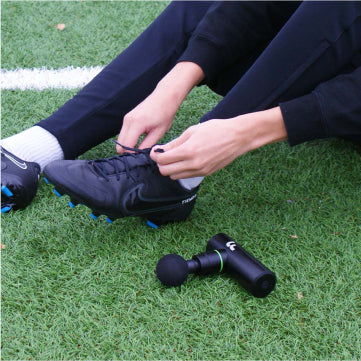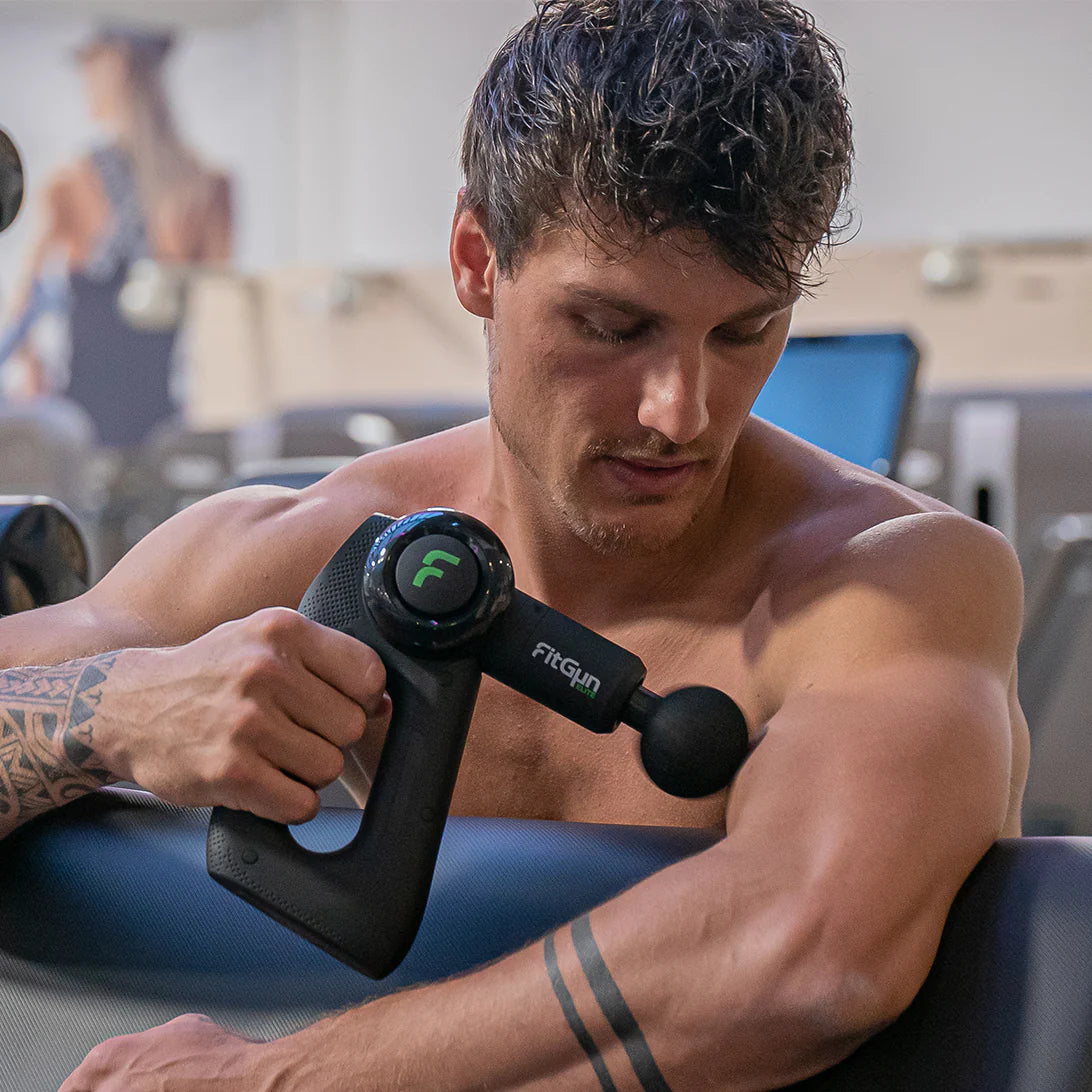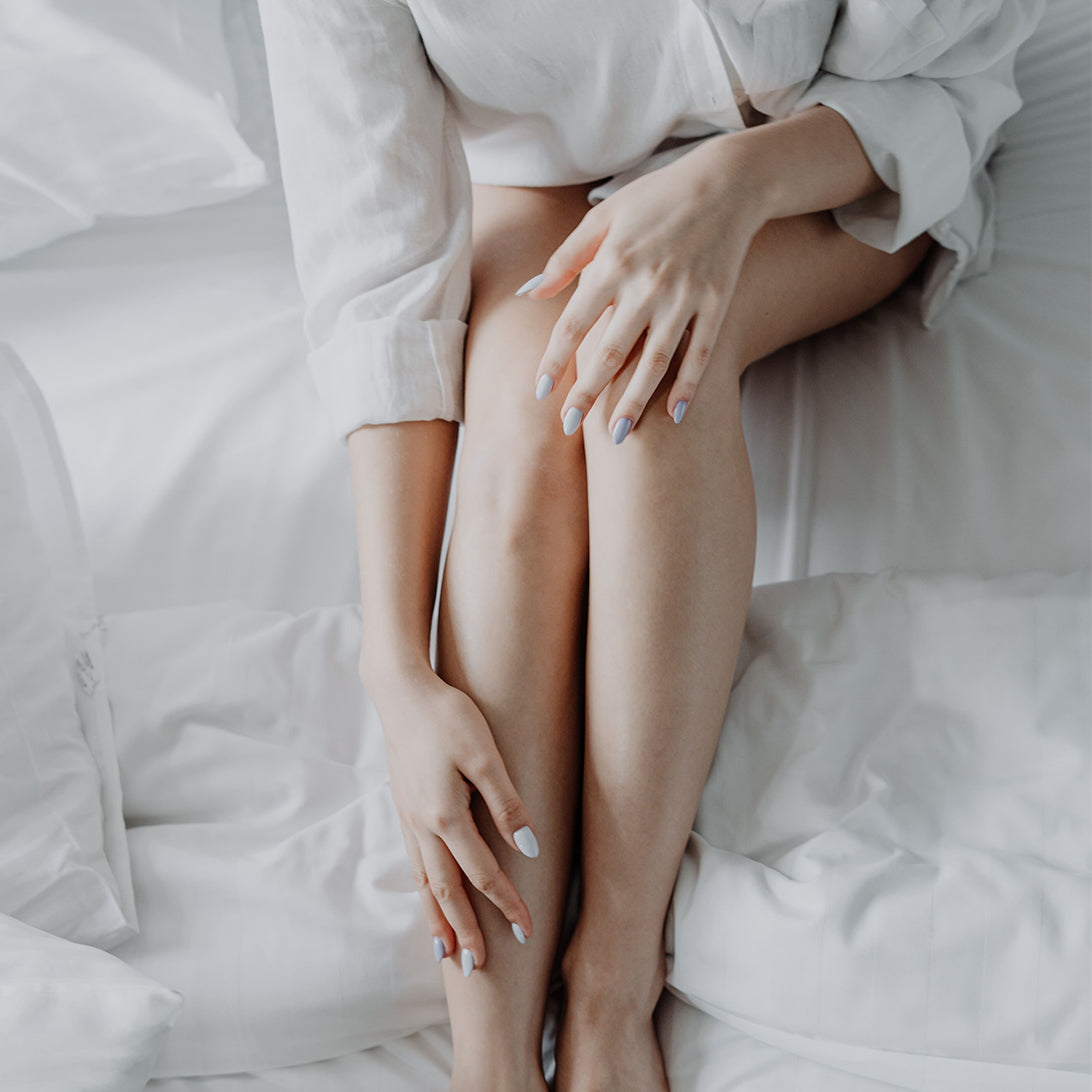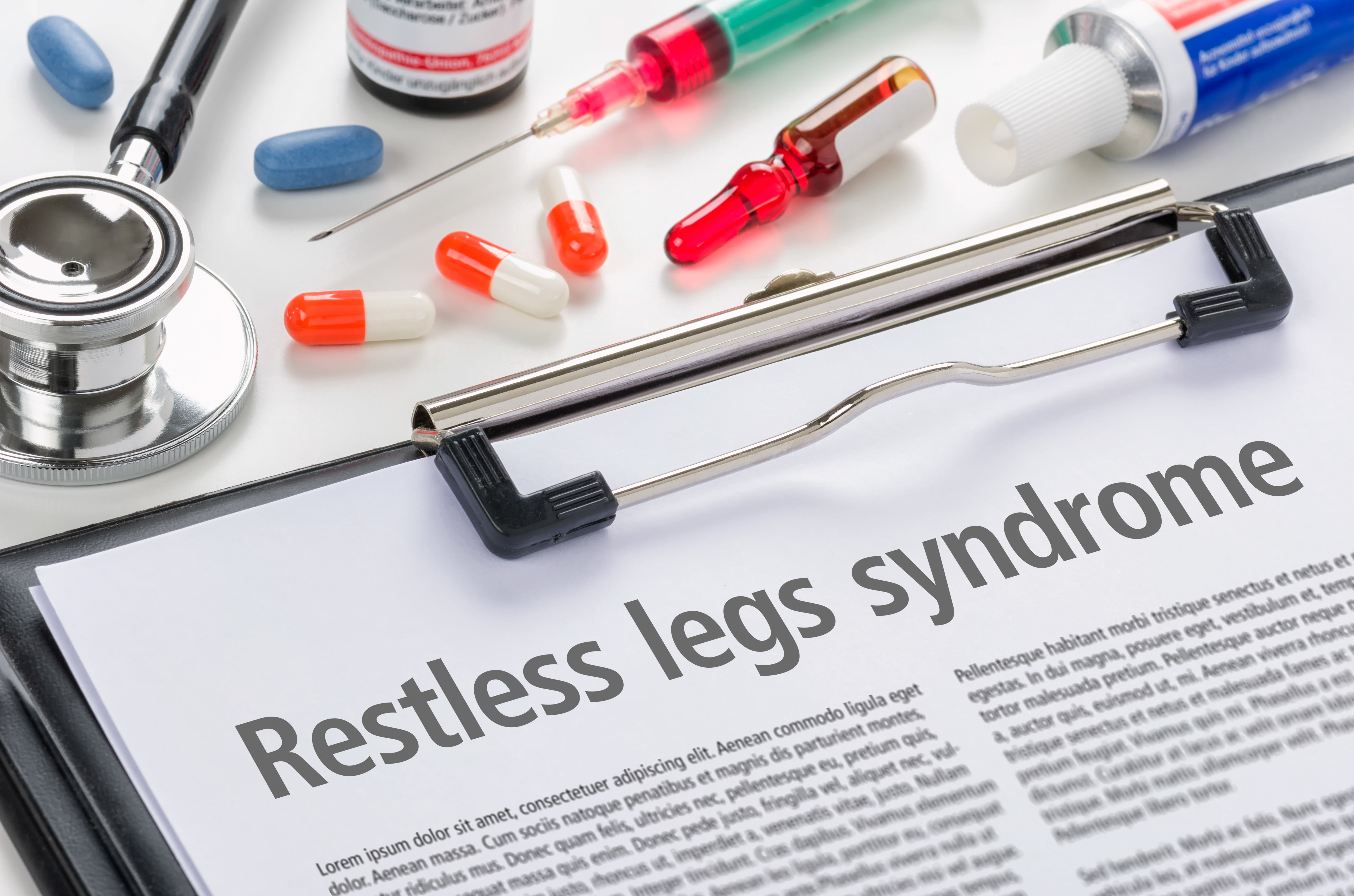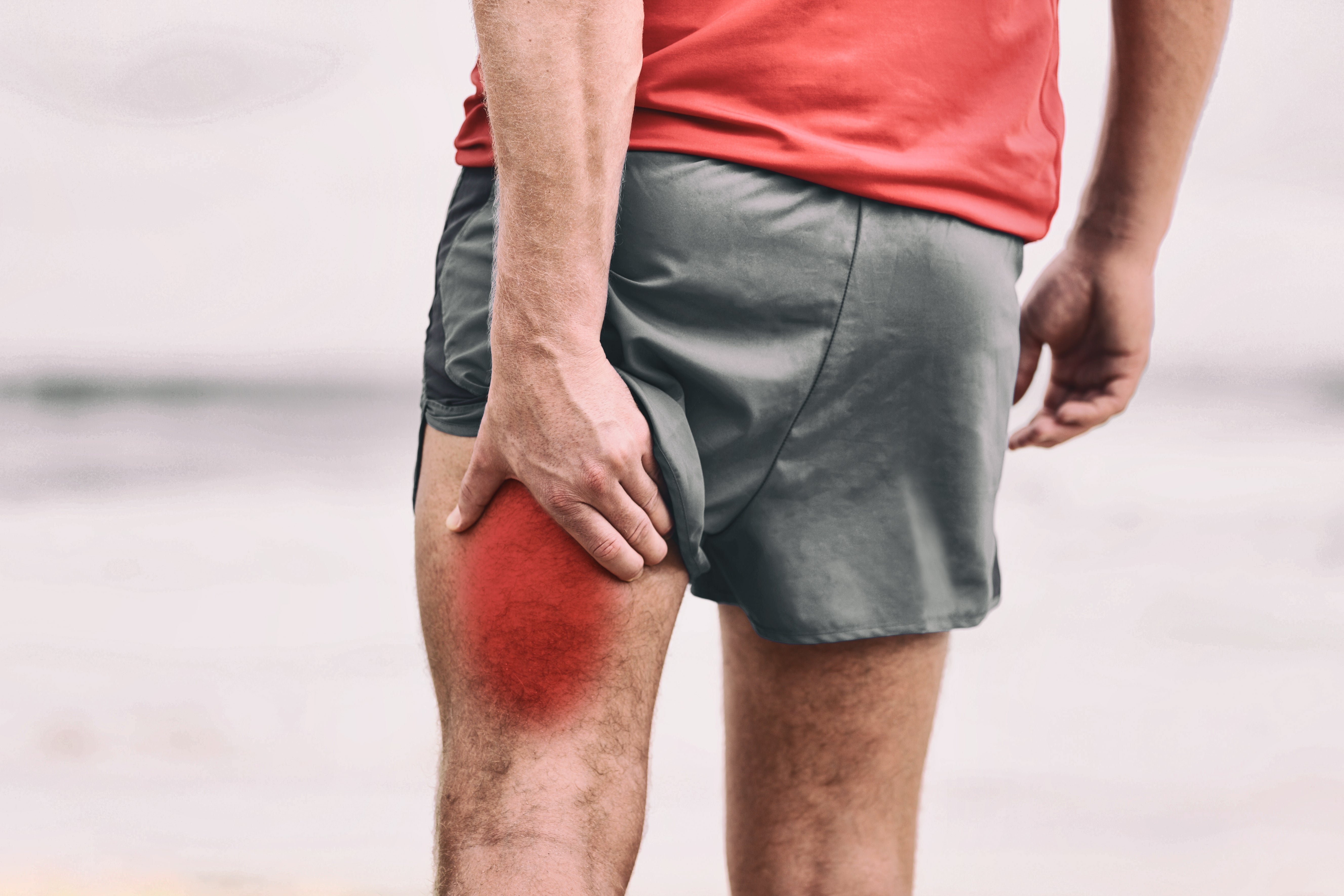Experiencing leg cramps while sleeping can be a frustrating and disruptive experience to your quality of life.
Leg cramps, also known as nighttime leg cramps or nocturnal leg cramps, are sudden and involuntary muscle contractions that can cause intense pain in the calf muscles. They are linked to RLS (restless legs syndrome) and can occur in any muscle group but are most common in the calf muscles.
While cramps can occur at any time during the day, they are most common at night when trying to get a good night's rest. They can get way worse if you're sleeping in an uncomfortable position or if you've been exercising a lot.
If you've ever experienced leg cramps while sleeping, you know how painful and disruptive they can be. Fortunately, you can take some simple steps to help treat or prevent them from occurring in the first place.
That's what you will learn in this article. But first, let's look at some common symptoms and causes of leg cramps at night. Let's go!
Symptoms of Leg Cramps While Sleeping
When it comes to leg cramps, the most common symptom is sudden and intense pain in the calf muscles. This pain can last anywhere from a few seconds to several minutes.
Other symptoms of leg cramps include:
1. Muscle spasms or twitching
Muscle spasms or twitching can also be a symptom of leg cramps while sleeping.
These spasms or twitches may occur in the calf muscles and other muscle groups. They can range from mild to severe and last from a few seconds to several minutes.
In some cases, they may even wake you up from your sleep. Muscle spasms or twitching can also be a sign of restless legs syndrome.
2. Difficulty moving the affected area
Another symptom of leg cramps at night is difficulty moving the affected area.
This can be due to the intense pain caused by the cramp and the muscle spasms or twitching that may accompany it. In some cases, you may find it difficult to move your leg or foot.
If this is the case, it's essential to seek medical attention as soon as possible.
3. Tightness in the calf muscles
Tightness in the calf muscles is another symptom of leg cramps while sleeping.
This tightness can range from mild to severe and can be accompanied by intense pain, muscle spasms, or twitching. It's important to note that this tightness may not always be present when experiencing a leg cramp.
However, if you experience tightness in your calf muscles, it's essential to seek medical attention as soon as possible.
4. Tingling or numbness in the legs
Tingling or numbness in the leg is another symptom of nocturnal cramps. This can be due to the intense pain caused by the cramp and the muscle spasms or twitching that may accompany it.
In some cases, you may also experience a burning sensation in your legs. If this is the case, it's important to seek medical attention as soon as possible.
These symptoms can be very disruptive to your sleep, so taking steps to prevent or treat them is essential. Let's look at some common causes of leg cramps while sleeping.
Possible Causes of Leg Cramps While Sleeping
Experiencing nocturnal leg cramps can be caused by various factors, including dehydration, electrolyte imbalances, muscle fatigue, and certain medications.
These risk factors can be further exacerbated by certain lifestyle choices such as smoking, drinking alcohol, and not getting enough exercise. Let's shed light on how these factors contribute to leg cramps while sleeping.
1. Dehydration
Dehydration is one of the most common causes of nocturnal leg cramps.
When your body is dehydrated, it can cause an electrolyte imbalance, leading to acute cramps. A lack of electrolytes can also cause your muscles to fatigue, leading to muscle spasms.
Muscle spasms can be very painful and disruptive to your sleep schedule. It's essential to make sure you're drinking enough water throughout the day to prevent dehydration.

2. Nerve damage
Leg cramps can also occur due to nerve damage.
Nerve damage can cause the muscles in your legs to become weak and spastic, leading to cramps. Nerve damage can be caused by various conditions such as diabetes, multiple sclerosis, and periodic limb movements of sleep.
Also known as PLMS, periodic limb movements of sleep are a sleep disorder that involves repetitive and involuntary leg movements.
Damage to the nerves is often irreversible, so it's essential to seek medical attention if you think you may be suffering from nerve damage.
3. Electrolyte imbalance
Electrolyte imbalances are another leading factor in experiencing acute cramps in the lower limbs.
They are minerals that help regulate the body's fluid balance and muscle contractions. When your electrolyte levels become imbalanced, it can lead to muscle cramping.
This is especially true if you're not getting enough potassium, magnesium, or calcium in your diet. If you're not sure you're getting enough electrolytes, it's a good idea to talk to your doctor about taking a supplement.
4. Muscle fatigue
Muscle fatigue is another common cause of leg cramps while sleeping.
When your leg muscles become fatigued, they can become weak and prone to cramping. This is especially true if you've been engaging in strenuous physical activity throughout the day.
Some activities that can lead to muscle fatigue include running, weightlifting, and playing sports. To help prevent muscle fatigue, ensure you get enough rest and perform mild exercises like stretching and yoga before bedtime.
5. Medications
When it comes to feeling cramps at night, certain medications can also be a contributing factor.
Some medications that can cause cramps include diuretics, statins, and beta-blockers. These drugs are often prescribed to treat high blood pressure, cholesterol, and other health conditions.
Diuretics cause the body to lose electrolytes, which can lead to cramping. Statins work by blocking the production of cholesterol, which can lead to muscle weakness and cramping. On the other hand, beta-blockers work by blocking certain hormones that can cause cramps.
If you're taking any of these medications, it's important to talk to your doctor about how they play a role in causing leg cramps.
Medical conditions have also been linked to leg cramps, so it's important to talk to your doctor if you're experiencing any other symptoms.
Let's look at some of the most common medical conditions that can cause leg cramps.
How Medical Conditions Play a Role in Causing Leg Cramps
Leg cramps can also manifest while sleeping due to underlying medical conditions.
Conditions such as arthritis, fibromyalgia, and thyroid disorders rank high on medical conditions that can cause leg cramps. Let's look at these conditions in more detail.
1. Diabetes
Diabetes is a chronic medical condition that affects the body's ability to produce or use insulin.
People with diabetes often experience leg cramps at night due to poor circulation and nerve damage. Diabetic neuropathy, or nerve damage caused by diabetes, can lead to muscle cramps in the lower limbs.
It occurs when the nerves cannot send signals properly, leading to muscle spasms. Treatment for diabetic neuropathy includes medications, lifestyle changes, and physical therapy.
2. Arthritis
Arthritis is a medical condition that affects the joints and can cause pain and stiffness. It's most common in the elderly but can also affect younger people.
Arthritis can lead to leg cramps because it affects the muscles and joints, making them weak and prone to cramping. It can be managed with medications and lifestyle changes, so it's important to talk to your doctor about the best treatment plan for you.
3. Thyroid disorders
Another medical condition that can lead to leg cramps while sleeping is thyroid disorder.
This medical condition occurs when the thyroid gland doesn't produce enough hormones, leading to a variety of symptoms.
When the thyroid isn't functioning properly, it can lead to muscle cramps in the lower limbs. Treatment for thyroid disorders includes medications, lifestyle changes, and dietary modifications.
If you think you may have a thyroid disorder, you must talk to your doctor about the best treatment plan. Common symptoms include fatigue, weight gain, and depression.
4. Fibromyalgia
Fibromyalgia is a chronic condition that causes widespread pain and fatigue throughout the body. It can also lead to muscle cramps in the lower limbs, especially at night when the muscles are more relaxed.
People with fibromyalgia may also experience other symptoms, such as headaches, insomnia, and depression. Treatment for fibromyalgia typically includes medications, lifestyle changes, and physical therapy.
That's it! These medical conditions are just a few that can lead to leg cramps while sleeping. If you think you may have one of these conditions, you must consult a medical professional about the best treatment plan for you.
Once you have a diagnosis, you can start working on managing your condition and reducing the frequency of your leg cramps. Let's look at some tips for managing nocturnal leg cramps.
Treatments for Leg Cramps While Sleeping
Treating leg cramps while sleeping can be tricky, but there are a few things you can do to help reduce the frequency and severity of your cramps. Some of them include the following:
1. Try stretching exercises
Stretching exercises are one of the most effective treatments for nocturnal leg cramps.
Some exercises that can help relieve cramps include hamstring, quadriceps, hip flexor and calf stretching exercises.
Hamstring stretches can be done by lying on your back and bringing one leg up towards your chest, while quadriceps stretches can be done by standing with one foot in front of the other. Bend the knee of the back leg.
Hip flexor stretches can be done by kneeling on one knee and bringing the other leg forward. For calf stretching exercises, stand facing a wall with one foot in front of the other. Lean forward and press your hands against the wall.
It's crucial to ensure you perform these exercises appropriately, as improper calf stretching exercises and other stretches can lead to extra strain and injury.
2. Get a massage
Massage can also be an effective treatment for nocturnal leg cramps.
It helps to relax the affected muscle and reduce tension, which can help reduce intense pain and discomfort associated with sleep-related leg cramps.
When massaging the affected area, use gentle pressure and circular motions. Getting a massage also helps to lower blood pressure and improve circulation. You can get a massage from a professional or do it yourself by using a massage gun.
3. Take electrolyte supplements
Electrolyte supplements can also be beneficial in treating cramps while sleeping.
Electrolytes are minerals that help regulate the body's fluids and muscle contractions. When electrolyte levels become imbalanced, it can lead to nocturnal leg muscle cramps.
Taking electrolyte supplements can help replenish lost electrolytes and reduce the potential risk of leg cramps while sleeping. Some common electrolyte supplements include magnesium, potassium, and calcium.
Moreover, over-the-counter medications such as ibuprofen or acetaminophen can help reduce inflammation and leg pain. If these medications don't relieve night leg cramps, your doctor may prescribe a stronger medication.
It's essential to consult your doctor before taking any supplements, as they may interact with other medications or have side effects.
What's more, if you have any medical condition, talk to your doctor before taking any supplements.
4. Heat therapy
Heat therapy is another option that is effective in treating nocturnal leg cramps.
It increases blood circulation to the affected area, which helps relax the muscles and reduce pain. You can apply heat therapy by using a heating pad or having a warm bath before bedtime.
If you're still experiencing nocturnal leg cramps after using a heating pad, it may be time to see a doctor. Your doctor can help determine the underlying cause of your cramps and provide additional treatment options.
In some cases, your doctor may recommend physical therapy, mild exercises or other treatments to help reduce the frequency and intensity of your cramps.
5. Apply Ice or cold therapy
Applying ice to the affected area can also help reduce pain and inflammation associated with nocturnal leg cramps.
Ice helps to constrict blood vessels, which reduces swelling and relieves pain. To apply ice therapy, wrap an ice pack in a towel and place it on the affected area for 10-15 minutes at a time.
Repeat this process several times throughout the day or before bedtime to help reduce the intensity of your cramps.
In conclusion, there are several treatments available for nocturnal leg cramps. Stretching, massage, electrolyte supplements, heat therapy, and ice application can all be effective in reducing pain and discomfort associated with cramps.
However, suppose you're still experiencing frequent or intense leg cramps while sleeping. In that case, you must consult your doctor or physical therapist for advice on which treatment suits you.
Let's dive into some of them.
Lifestyle Changes to Prevent Leg Cramps While Sleeping
When it comes to preventing sleep-related leg cramps, lifestyle changes can be very effective.
They can help reduce the frequency and intensity of night leg cramps and make them less likely to occur. Here are some lifestyle changes to keep in mind:
1. Avoid caffeine and alcohol before bedtime
Avoiding caffeine and alcohol before bedtime is vital as these substances can contribute to cramps, sleep disorders and poor health.
Caffeine is a stimulant that can increase muscle tension and make it more likely for you to experience leg cramps at night. Alcohol, on the other hand, can cause dehydration which can lead to electrolyte imbalances and an increased risk of leg cramps.
That's why it's essential to avoid these substances before bedtime.
2. Stay hydrated
Staying hydrated is an essential part of preventing nocturnal leg cramps.
When dehydrated, your body can become imbalanced in electrolytes, leading to muscle cramps. Make sure to drink plenty of water throughout the day and avoid drinks that contain caffeine or alcohol before bedtime.
Additionally, eating foods high in electrolytes, such as bananas, oranges, and spinach, can help keep your body balanced and reduce the potential risks of cramps.
3. Get enough sleep
Getting enough sleep is essential for preventing night leg cramps.
When you don't get enough rest, your body can become fatigued and more prone to muscle cramps. Aim to get 7-9 hours of quality sleep each night to ensure that your body has the time to rest and recover.
Additionally, try to go to bed and wake up at the same time each day to help regulate your body's internal clock.
4. Wear comfortable shoes
Wearing comfortable shoes is another essential part of preventing nocturnal leg muscle cramps. Shoes that are too tight or have poor support can cause your feet to become strained and increase the potential risk of legs cramps.
It is essential to wear shoes that fit properly and provide adequate arch support. Also, avoid wearing high heels or other uncomfortable shoes for extended periods, as this can increase the risk of night leg cramps.
5. Eat foods that are rich in minerals such as magnesium, potassium, and calcium
Eating a healthy diet is also essential for preventing nocturnal leg cramps.
A balanced diet with plenty of fruits, vegetables, and whole grains can help keep your body nourished and reduce the potential risk of muscle cramps. Additionally, limit processed foods and sugary snacks as these can cause inflammation and increase the risk of cramps.
You should also ensure to get enough calcium and magnesium, as these minerals are essential for muscle health and can help reduce the potential risk of leg cramps.
6. Avoid sitting or standing in one position for too long
Avoiding sitting or standing in one place for too long can help reduce the potential risk of leg cramps.
When you stay in one position for too long, your muscles can become strained and more prone to cramping. Try to take regular breaks throughout the day and move around as much as possible to keep your muscles relaxed and reduce the potential risk of nocturnal leg cramps.
If you must stand or sit for extended periods, stretch your legs and move around as much as possible. Following these lifestyle changes can help reduce the frequency and intensity of night leg cramps and make them less likely to occur.
You can also try out fitness tools to help reduce the risk of leg cramps. Massage and compression therapy tools can help relax your muscles and reduce the potential risk of nocturnal leg cramps. Let's find out more about these tools and how they can help.
Fitness Devices That Relieve Leg Cramps While Sleeping
Fitness devices can be a great way to help ease leg cramps while sleeping. Several fitness devices on the market are designed specifically for this purpose.
These devices use electrical stimulation to help relax the muscles and reduce the intensity of leg cramps. Some of them include the following:
1. Massage ball
A massage ball is a small device that can be used to massage your legs and help reduce the intensity of cramps.
The ball is designed to provide targeted relief and can be used while lying in bed or sitting in a chair. To use it, place the ball on the affected area and massage it in a circular motion.
2. Foam roller
A foam roller is another excellent tool for relieving leg cramps while sleeping.
This device is designed to provide targeted relief and can be used while lying in bed or sitting in a chair. To use it, simply place the foam roller on the affected area and roll it back and forth until the muscle relaxes. Just make sure to use gentle pressure and avoid rolling too hard.
3. Air C pro
Air C pro is an excellent tool for anyone who suffers from leg cramps while sleeping. It's a compression therapy tool that uses air compression to help reduce the intensity of leg cramps.
This device is designed to provide targeted relief and can be used while lying in bed or sitting in a chair.
To use it, simply place the device on the affected area and turn it on. The air pressure will then help relax the muscle and reduce the intensity of leg cramps.

4. Compression socks
Compression socks are another great tool for relieving leg cramps while sleeping. Compression socks provide gentle pressure to the legs and help reduce the intensity of leg cramps. They also help improve circulation, which can help reduce the risk of nocturnal leg cramps.
Compression socks come in various sizes and styles, so it's essential to find a pair that fits properly.
Using these fitness tools can help reduce the frequency and intensity of night leg cramps and make them less likely to occur. So, if you suffer from nocturnal leg cramps, try these tools and see if they help.
Frequently Asked Questions
Let's examine some of the most frequently asked questions about nocturnal leg cramps. Some of them include the following:
How can I tell if I have leg cramps?
A leg cramp can feel like a sudden, sharp pain in the muscle. It may also feel like a tightness or knot in the muscle.
The affected area may be tender to the touch, and you may experience difficulty moving your leg. Sometimes, you may even feel tingling sensations and involuntary leg movements. Acute cramps can also cause swelling and redness in the affected area.
What is the typical duration of a leg cramp?
Leg cramps can range in duration from a few seconds to several minutes, sometimes lasting up to an hour or longer. The duration of the cramp will depend on the underlying cause and how quickly you can address it.
If you experience a leg cramp, it is essential to stretch the affected muscle as soon as possible. This can help reduce the intensity and duration of the cramp.
Does having leg cramps mean I have a severe medical condition?
Having leg cramps does not necessarily mean that you have a medical condition. However, it can signify something more serious, such as an electrolyte imbalance or medical conditions like restless legs syndrome.
Suppose you experience frequent or severe leg cramps. In that case, you must speak with your healthcare provider to determine the underlying cause of this poor health and medical condition.
What's more, if you have a medical history of diabetes or other chronic conditions, it is essential to speak with your doctor before taking any supplements for acute cramps.
Which fitness devices can be used to help relieve leg cramps?
Medical devices can be used to help relieve nocturnal leg muscle cramps.
Compression stockings, braces, and splints can all be used to provide support and reduce the risk of leg cramps. Electrical stimulation devices such as transcutaneous electrical nerve stimulation (TENS) units can also stimulate the affected area and reduce muscle spasms.
For those who experience frequent or acute cramps, medications such as quinine or diltiazem may be prescribed to help reduce the frequency and intensity of the cramps.
Can leg cramps occur as a result of a vitamin deficiency?
Vitamin deficiencies can be a common cause of nocturnal leg cramps. A lack of specific vitamins and minerals, such as calcium, magnesium, potassium, and vitamin D, can lead to muscle spasms and cramps.
Calcium is essential for muscle contraction and relaxation, so a deficiency can increase the risk of leg cramps. Magnesium helps regulate nerve impulses and muscle
When should I consult a medical professional for my leg cramps?
Regarding leg cramps, it is essential to speak with your healthcare provider if they are severe or occur frequently.
Your healthcare provider can help determine the underlying cause of your cramps and provide effective treatment options that may help reduce pain. They can also recommend lifestyle changes that may help prevent future episodes of leg cramps.
Suppose you experience other symptoms along with your leg cramps, such as numbness or tingling. In that case, it is essential to seek medical attention.
Conclusion
Leg cramps while sleeping can be an uncomfortable and often painful experience that can lead to sleep disorders, leaving you exhausted the next day.
Fortunately, there are steps you can take to help prevent nocturnal leg muscle cramps, such as wearing comfortable shoes for extended periods.
Additionally, it is essential to speak with your healthcare provider if you experience frequent or severe leg cramps, as this may indicate an underlying medical condition and poor health.
We hope this article has provided helpful information on preventing and treating sleep-related leg cramps. Let us know if you have any questions or comments.
